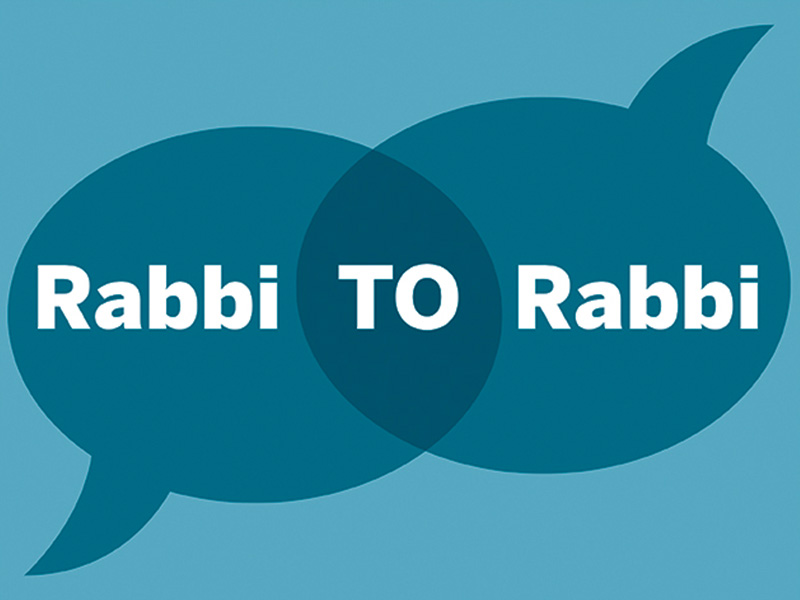How can rabbis stay engaged with the outside world and balance teaching passion for Judaism with an appreciation of other cultures?
Rabbi Adam Cutler
Beth Tzedec Congregation, Toronto
Rabbi Adam Scheier
Congregation Shaar Hashomayim, Montreal
Rabbi Cutler: On a recent flight to Israel, I sat in front of a Christian pilgrim from Calgary who had never before been on an airplane. On my return flight, I sat beside a young Eritrean man, also on his maiden flight, who was immigrating to Calgary after living for five years in Israel. As a frequent traveller to Israel, I was pleased to be among first-time flyers. And as a North American Jew, I was interested to hear the experiences of a religious Christian and an African migrant.
We congregational rabbis spend most of our professional and personal lives surrounded by people with a shared religion from a small geographical catchment. Except when we are engaged in inter-religious dialogue or mentoring someone toward conversion, many congregational rabbis have little substantive interaction with non-Jews. Yet, there is a much larger world beyond our own shtetls. That is the world in which most of our congregants live.
How do you stay engaged with the worldwide human community? What losses are there in living a more cloistered life than most?
Rabbi Scheier: I think many would object to describing a modern Canadian Jew’s life as “cloistered.” But, to an extent, everyone leads a slightly cloistered life. I once read a statistic that the average, city-dwelling person will meet three new people every day. Over the course of an average lifespan, this comes out to 80,000 acquaintances. While I would hardly call this a shtetl, compare it to the global population – or even the population of our cities – and we ultimately interact with a very small corner of the world.
I once saw a beautiful interpretation of the teaching in Pirkei Avot (4:12), which says in the name of Rabbi Meir, “engage in Torah study, be humble of spirit before every person.” The commentator suggested this passage can be read as a warning to those who admirably immerse themselves in Torah study. Be mindful, the teaching exhorts, for even as we immerse ourselves in our own communities of like-minded friends, we are responsible to interact with respect with every person.
How do you think this objective is best accomplished? Beyond the occasional conversations with fellow travellers of different backgrounds, what responsibility do you see for engagement with a broader swath of humanity?
Rabbi Cutler: I often remind myself that God’s covenant with Noah precedes God’s covenant with Abraham. We are people before we are Jews.
As Jewish adults – all the more so as rabbis – I think we must connect with the greater world around us. We must read great literature and experience local culture. Not only does this link us to our congregants (who are also doing this), but it allows us to experience a part of God’s creation. Such activities thicken the experience of being a person, which hopefully can only strengthen the experience of being a Jew.
What becomes tricky is the appropriate educational balance for children. To what extent should Jewish children be educated in the holidays, rituals and beliefs of others? How much time do we want to allocate for children to become knowledgeable world citizens versus committed to Jewish particularity? I believe the experience of being both human and Jewish requires us to engage deeply with Jewish wisdom and more general culture.
How do you balance the two?
Rabbi Scheier: When we speak about “connecting” with the greater world, I agree with you that this is a virtue that I endorse. As a former English literature major, I will often use aspects of literature to illuminate concepts or messages. (For example, as a source for my now-three-year-old daughter Allegra’s name, I cited Longfellow’s The Children’s Hour, which mentioned the poet’s daughter “laughing Allegra” – a blessing that has proved true in our home.)
However, I would differentiate between appreciation and passion. We must appreciate the beauty and depth that surrounds us, but at the same time, as rabbis, we teach passion for our own religion and its teachings. There is a delicate balancing act between teaching other faiths and doing so in a way that recognizes the uniqueness of our own tradition, without disparaging that of others.
If we can teach a passion for Judaism which is elevated and bolstered by an appreciation for local and foreign cultures, then we’ve embraced a strong Jewish identity for the 21st century.
Click here for last week’s edition of Rabbi to Rabbi
